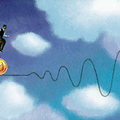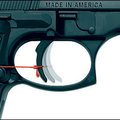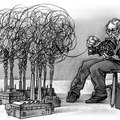DEARBORN, Mich., April 26 — The Ford Motor Company narrowed its first-quarter loss after eliminating thousands of jobs and cutting millions of dollars in spending, but the company’s chief executive acknowledged today that “we still have a long way to go to turn around this business.”
It was the seventh consecutive quarterly loss for Ford, which continues to grapple with a vehicle lineup dominated by slower-selling trucks. And the company’s losses increased in North America, where it has steadily lost market share.
But the loss of $282 million, or 15 cents a share, was a significant improvement from 2006, and it was considerably better than the loss of 60 cents a share that analysts had expected. Ford lost $1.4 billion, or 76 cents a share, in the period a year earlier on its way to a record loss of $12.7 billion for the full year. Revenue in the quarter was $43 billion, up from $40.8 billion a year ago.
Himanshu Patel, an analyst with JPMorgan Chase in New York, described the results as “quite impressive.”
Shares of Ford were up more than 4 percent, to $8.21 in midday trading on the New York Stock Exchange.
“This has been an encouraging quarter for the company,” said Alan R. Mulally, the chief executive, “but turning around the business will not be a quick or easy process.”
Ford said one-time costs like expenses related to its restructuring effort, known as the “Way Forward,” accounted for $113 million of the first-quarter loss. About 33,300 hourly and salaried workers in North America have left their jobs at Ford since the beginning of 2006 after accepting a buyout or early retirement offer. The departures leave Ford with more workers in Europe than in North America for the first time in its history.
About 2,000 hourly workers who initially agreed to take a buyout changed their minds and have stayed at Ford, said the chief financial officer, Don R. Leclair, although he added that there were no plans to compensate with further cuts.
In North America, the focus of the restructuring plan, Ford lost $614 million from automotive operations, $172 million more than a year ago, because of lower sales of its most profitable vehicles. Ford and other automakers make the most money on sport utility vehicles and pickup trucks, which have fallen out of favor for many consumers amid high gas prices. Revenue from North America was $18.2 billion, down from $19.8 billion.
Ford has said it does not expect to be profitable in North America until 2009, a year later than it initially projected in the Way Forward 15 months ago.
“North America continues along the path toward profitability,” Mr. Mulally said today. “We still have a lot of difficult work ahead, but we are on plan.”
On a conference call with reporters and analysts, Mr. Mulally and Mr. Leclair seemed to vacillate between characterizing the results as better than expected and in line with internal expectations. An analyst, Brian Johnson of Lehman Brothers in New York, noted that Ford has a penchant for posting surprisingly strong results in the first three months of a year, having beaten Wall Street’s estimates in 8 of the last 10 first quarters.
“While Mulally’s game plan may or may not be sufficient for a longer-term turnaround, we do not believe investors should look for quick results,” Mr. Johnson wrote in a note to clients this week before Ford reported its results. “Many elements of classic ‘crisis management’ turnaround appear to be missing from the Ford picture — and may leave openings for later criticism.”
The company was profitable in Europe and South America, and it reported a record profit of $402 million from its Premier Automotive Group, up from $152 million a year ago. Premier Automotive includes Aston Martin, which Ford recently agreed to sell to a group of investors led by the British racing mogul David Richards, as well as the Volvo, Jaguar and Land Rover brands.
The automaker’s finance arm, Ford Motor Credit, earned $193 million, $55 million less than a year ago because of higher borrowing costs and depreciation expenses for leased vehicles. For all of 2007, Mr. Leclair said Ford Motor Credit, which has been one of the few consistent sources of profits for Ford, is expected to earn about $1.2 billion before taxes, down from $3.1 billion last year.





